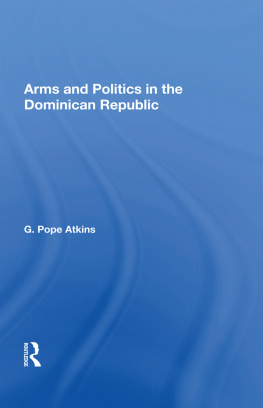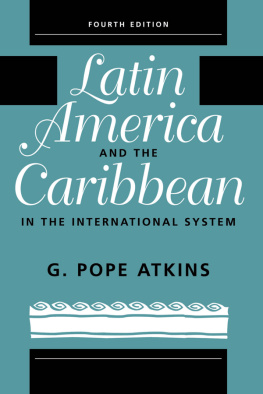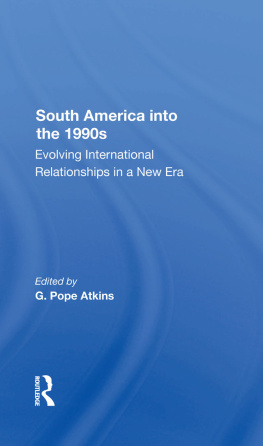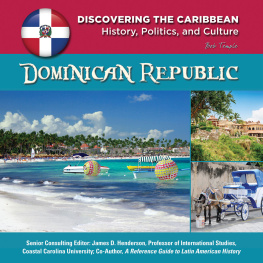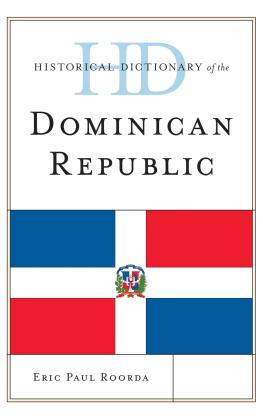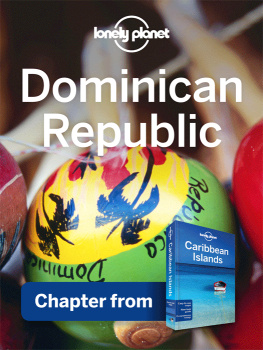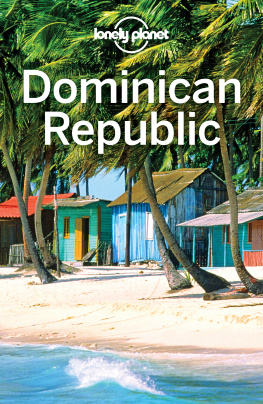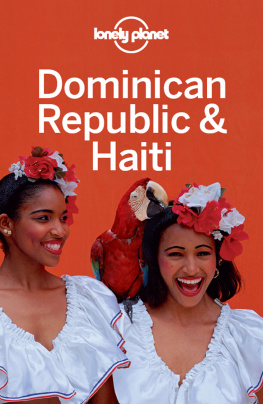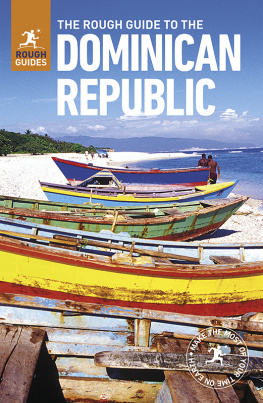Arms and Politics in the Dominican Republic
Also of Interest
U.S. Policy in the Caribbean , John Bartlow Martin
The Dominican Republic , Ian Bell
Latin America, the United States, and the Inter-American System , John D. Martz and Lars Schoultz
The Continuing Struggle for Democracy in Latin America , edited by Howard J. Wiarda
The End and the Beginning: The Nicaraguan Revolution , John A. Booth
Nicaragua: A Profile , Thomas W. Walker
Global Human Rights: Public Policies, Comparative Measures, and NGO Strategies , edited by Ved P. Nanda, James R. Scarritt, and George W. Shepherd, Jr.
Available in hardcover and paperback.
Westview Special Studies on Latin America and the Caribbean
Arms and Politics in the Dominican Republic
G. Pope Atkins
This chronicle and interpretation of recent military and political events in the Dominican Republic analyzes the political behavior of the countryfs armed forces and scrutinizes policies put in action since the nations civil war and the subsequent U.S. intervention of 1965.
Dr. Atkins covers the course of Joaquin Balaguers lengthy presidency, the remarkable events surrounding the 1978 election of President Antonio Guzman, and the first months of Guzmans administration, with particular attention being given to the role of the armed forces in political processes. In describing the Dominican experience with arms and politics, Dr. Atkins notes that it is a case of noninstitutionalized civil-military relations revolving around the president, his key associates, and the officers of the military.
G. Pope Atkins is professor of political science and chairman of the department at the U.S. Naval Academy at Annapolis. He has written widely on Latin America, making extended visits to conduct interviews, to observe events firsthand, and to review materials difficult to obtain from outside the countries he has studied. Among his books is Latin America in the International Political System .
First published 1981 by Westview Press
Published 2018 by Routledge
52 Vanderbilt Avenue, New York, NY 10017
2 Park Square, Milton Park, Abingdon, Oxon OX14 4RN
Routledge is an imprint of the Taylor & Francis Group, an informa business
Copyright 1981 by Taylor & Francis
All rights reserved. No part of this book may be reprinted or reproduced or utilised in any form or by any electronic, mechanical, or other means, now known or hereafter invented, including photocopying and recording, or in any information storage or retrieval system, without permission in writing from the publishers.
Notice:
Product or corporate names may be trademarks or registered trademarks, and are used only for identification and explanation without intent to infringe.
Library of Congress Cataloging in Publication Data
Atkins, G. Pope, 1934-
Arms and politics in the Dominican Republic.
Bibliography: p.
Includes index. 1. Dominican RepublicPolitics and government1961- . 2. Dominican
RepublicArmed ForcesPolitical activity. 3. Civil supremacy over the
militaryDominican Republic. I. Title.
F1938.55.A87 322 .5097293 80-28450
ISBN 0-86531-112-9
ISBN 13: 978-0-367-01865-8 (hbk)
This study is a chronicle and interpretation of recent military-political events in the Dominican Republic. It analyzes the political behavior of armed forces and national police since the civil war and U.S. intervention of 1965. The Dominican experience with arms and politics is a case of noninstitutionalized civil-military relations. That is, relations revolved around personal interactions among the president or his key associates and important military officers, as well as among the officers themselves, rather than processes involving a bureaucratically well-organized presidency and military establishment.
While considerable attention has been devoted to military affairs in the Dominican Republic from the assassination of dictator Rafael Trujillo in 1961 through the crisis of 1965, little has been written about the course of Joaquin Balaguers lengthy presidency (196678) or the remarkable events surrounding the 1978 election of Antonio Guzman and the subsequent first months of his administration. This complex thirteen-year period was a crucial one for Dominican development. The most important political dynamics had to do with the role of the armed forces in political processes. Under Balaguer, the key factor was the presidents personal manipulation of numerous officers employing a variety of techniques. Guzmns major goal was to depoliticize the armed forces and police; it was realized in the sense that officers became less blatantly political and the president gained control of military affairs.
As a student of international and comparative Latin American politics, I have long had a special interest in the Dominican Republic. This book is a sequel to an earlier one that I coauthored with Larman C. Wilson ( The United States and the Trujillo Regime , 1972), although the earlier work was concerned primarily with U.S. policy and the present effort focuses on domestic Dominican politics. I made three trips to the Dominican Republic in 1978 and 1979 in connection with research on this project, including an extended stay through the summer of 1978, in order to conduct interviews and review materials difficult to obtain outside the country. Thus, this book depends on my past research and experience with the Dominican Republic, some recent literature on the subject, my own participant observations, and information and insights gained from interviews and conversations with many people involved with or familiar with Dominican armed forces and politics.
Appreciation is expressed to the many people who extended courtesies and assistance during my visits to the Dominican Republic. Frank Moya Pons, Director of the Fondo para el Avance de las Ciencias Sociales in Santo Domingo, generously provided academic hospitality and constructive criticism. Sandra Erb applied superb computer skills to the editing process and production of the final copy for publication. I am solely responsible for any errors of fact or interpretation.
G. Pope Atkins
Arms and Politics in the Dominican Republic
1
Introduction
Arms and politics in the Dominican Republic since the crisis of 1965, affected by special circumstances and peculiar dynamics of Dominican social processes, have not been a microcosm of Latin American civilmilitary relations. While extant theory about Latin America alerts us to questions and explanations that should be addressed in the Dominican context; the remarks that follow suggest general inadequacies with theoretical perspectives about Latin American civil-military relations when applied to the Dominican experience. However, this chapter does not analyze contemporary theory, or even summarize its content. It has the considerably more modest purpose of offering some concepts considered central to understanding Dominican processes.
Theoretical Shortcomings . Deep military involvement in Latin American politics has been a salient feature of the regions history since its national beginnings. Curiously, this phenomenon did not receive systematic analysis until the late 1950s. Since then, scholarship devoted to Latin American civil-military relations has undergone continuous conceptual change. Distinct and contending theoretical schools developed, and an array of perspectives emerged about the proper emphasis that should be placed on various factors for explaining political behavior of Latin American armed forces. But the Dominican experience with arms and politics since 1965 defies categorization and generally supports no extant theoretical position.

